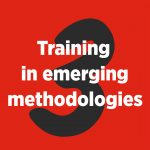In the Spring of 2019, the Brown University Library conducted interviews with faculty within the fields of Modern Languages and Literatures to gain insight into how the Library can best serve their needs in the twenty-first century. Four librarians selected and interviewed sixteen faculty members in order to capture the breadth of research activities in literature in all languages, culture, and writing studies at Brown University. The selected faculty are from fourteen departments, with nine at the rank of Professor, five Associate Professors, and two Assistant Professors. Four faculty members were department chairs.
What hurdles do faculty face in their research that the Library could better support? What ideas or services do we not yet offer that we could strategically work towards offering? What existing strengths or services could be expanded to encourage faculty participation?
Here are five of the things we learned (read the full report):
The Five Takeaways

Faculty want a more intuitive, user-focused search environment to support research.
Faculty, and particularly newer faculty, want integrated research tools that offer a more comprehensive research process. They find Brown University Library platforms, including Josiah, the BDR, the Library website, and resources from partners of the Brown University Library difficult to navigate.
Recommendation for the Library: Conduct a user experience study on the Library catalog, BDR, and the Library website. Further research is needed in order to incorporate the input from scholars across disciplines beyond modern literatures and languages.




